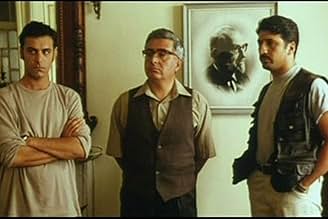Füge eine Handlung in deiner Sprache hinzuOn a misty morning, an old bus leaves Batum to go to Istanbul. As the bus stops at various places on the way, Russian women of all ages and professions, each with a unique tale, board. In th... Alles lesenOn a misty morning, an old bus leaves Batum to go to Istanbul. As the bus stops at various places on the way, Russian women of all ages and professions, each with a unique tale, board. In this bus full of women, there are three Turkish men. Three brothers who have come together a... Alles lesenOn a misty morning, an old bus leaves Batum to go to Istanbul. As the bus stops at various places on the way, Russian women of all ages and professions, each with a unique tale, board. In this bus full of women, there are three Turkish men. Three brothers who have come together after many years to carry their father's last wish.
- Regisseur/-in
- Autor/-in
- Stars
- Auszeichnungen
- 2 Gewinne & 8 Nominierungen insgesamt
Empfohlene Bewertungen
The Turkish - Russian Connection
Better than "The Horse"-now my favorite Ozgenturk film
Starts well, then falls apart; disappointing by the end
The group of women is very diverse, and yet - a few of them seem to know Turkish rather well, which makes the situation seem contrived. In this respect the movie is quite silly to begin with and the transitions between the languages for the non-Russian and non-Turkish speaker may seem seamless, but they are one of the things that hurt the film's credibility. It's as if the whole setup was meant to create the situation get 3 Turkish guys with a bunch of beautiful Russian women and get the story going from there, without taking into account at all almost any language barriers (they do exist in one couple's case though).
The gallery of characters is rather interesting, but it is never explained why the women are forced to work as prostitute in Turkey. The mafia people who handle their transport are mean people, sometimes depicted in a ridiculous way, especially when they demand that a woman who works for them and is helping her cousin to get to Turkey to get a new prosthesis will hand the poor girl to them as one of the prostitute. It's not even clear if the
act of bringing these women to Turkey is illegal or not.
Once the bus crosses the border and the band gets stuck is some hole in the mountains the story starts to fall apart, with numerous mistakes of continuity and plot. It just goes downhill from there till the silly and unconvincing ending. Individual characters are sketched rather well, but any character interactions after that tends to be simply dull, if not really stupid. I'll point this one as an example: All the women are intrigued by the oldest brother a guy of 55 or so instead of his rather handsome little brother of about 27. The character is a real bore and lacks any charisma that might have been included in the script.
As a whole, the movie is not a good one and does not get above 4/10. It's not a real bore though, so if you want to get some folklore you may get that in the bus scenes.
Wusstest du schon
- WissenswertesKemal Sunal was to play Necati but following his sudden death prior to the shooting, Ugur Yücel was brought in to play that character.
Top-Auswahl
Details
- Laufzeit
- 1 Std. 56 Min.(116 min)
- Farbe






















